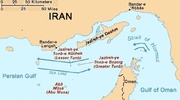Ali Akbar Velayati addressed the 2nd International and 14th National Genetics Congress held in Shahid Beheshti University on Saturday, where he traced practicing genetics and the science of origins back to Iranian’s in ancient Elamite civilization in southwestern Iran; “the evidence coming from clay pottery of ancient Elam washes away any doubts that Iranians had long been practicing the science of origin of species; Iran is the cradle of this science, which is also home to more than 7,500 plant species with wide diversity, effectively making the country the ‘valuable genetic reserve,’” he told the meeting.
Head of Strategic Research Center of the Expediency Council added that Iran had also been home to many species in agriculture and food; “genetic diversity is a key factor contributing to sources of food, pharmaceuticals, and important industrial raw material; we should protect this diversity; this would entail curtailing access by foreign countries’ encroachments on Iran’s natural resources with objective of plundering its reserves, either natural or man-made,” Velayati told the congress.
“More food production using few acres of land and optimized and efficient use of water resources, decreased pesticides, promoting favorable traits in plants, decreased greenhouse gas emissions, production of valuable molecules with applications in medicine, are all achievements of genetic, especially genetic engineering in agriculture,” Velayati emphasized. “Creating accurate genetic maps and sequence identification, accelerated diagnosis of diseases and alleviating the sufferings of people through timely diagnosis and treatment of diseases, DNA fingerprinting, production of recombinant vaccines and medications, and birth of transgenic animals had been only part of revolutionizing impact of the science.”
Velayati however criticized opposition by specific circles, who, had mislead the public by resorting to fiqh improperly; “man’s domination over processes inside cells and manipulation of these processes have given us upper-hand in treating cancers, creating libraries of genomes and modelling all creatures’ genome in the road to harness this science capabilities in production of smart-delivery drugs and medications,” he concluded.
SH/3664153


























Your Comment